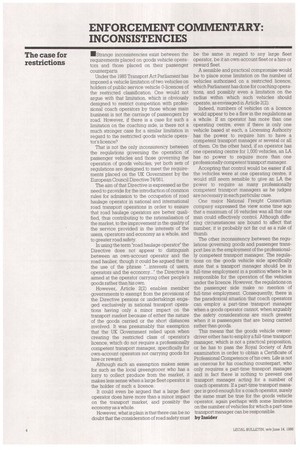ENFORCEMENT COMMENTARY: INCONSISTENCIES
Page 26

If you've noticed an error in this article please click here to report it so we can fix it.
The case for restrictions
EStrange inconsistencies exist between the requirements placed on goods vehicle operators and those placed on their passenger counterparts.
Under the 1985 Transport Act Parliament has imposed a vehicle limitation of two vehicles on holders of public service vehicle 0-licences of the restricted classification. One would not argue with that limitation, which is obviously designed to restrict competition with professional coach operators by those whose main business is not the carriage of passengers by road. However, if there is a case for such a limitation on the coaching side, is there not a much stronger case for a similar limitation in regard to the restricted goods vehicle operator's licence?
That is not the only Inconsistency between the regulations governing the operation of passenger vehicles and those governing the operation of goods vehicles, yet both sets of regulations are designed to meet the requirements placed on the UK Government by the European Council Directive 74/561.
The aim of that Directive is expressed as the need to provide for the introduction of common rules for admission to the occupation of road haulage operator in national and international road transport operations in order to ensure that road haulage operators are better qualified, thus contributing to the rationalisation of the market, to the improvement in the quality of the service provided in the interests of the users, operators and economy as a whole, and to greater road safety.
In using the term "road haulage operator" the Directive does not appear to distinguish between an own-account operator and the road haulier, though it could be argued that in the use of the phrase "...interests of users, operators and the economy..." the Directive is aimed at the operator carrying other people's goods rather than his own.
However, Article 2(2) enables member governments to exempt from the provisions of the Directive persons or undertakings engaged exclusively in national transport operations having only a minor impact on the transport market because of either the nature of the goods carried or the short distances involved. It was presumably this exemption that the UK Government relied upon when creating the restricted claes of operator's licence, which do not require a professionally competent transport manager, specifically for own-account operators not carrying goods for hire or reward.
Although such an exemption makes sense for such as the local greengrocer who has a lorry to collect produce from the market, it makes less sense when a large fleet operator is the holder of such a licence.
It could even be argued that a large fleet operator does have more than a minor impact on the transport market, and possibly the economy as a whole.
However, what is plain is that there can be no doubt that the consideration of road safety must be the same in regard to any large fleet operator, be it an own-account fleet or a hire or reward fleet.
A sensible and practical compromise would be to place some limitation on the number of vehicles authonsed on a restricted licence, which Parliament has done for coaching operations, and possibly even a limitation on the radius within which such vehicles should operate, as envisaged in Article 2(2).
Indeed, numbers of vehicles on a licence would appear to be a flaw in the regulations as a whole. If an operator has more than one operating centre, even if there is only one vehicle based at each, a Licensing Authority has the power to require him to have a competent transport manager at several or all of them. On the other hand, if an operator has one operating centre for 1,000 vehicles, an LA has no power to require more than one professionally competent transport manager.
Accepting that control would be easier if all the vehicles were at one operating centre, it would still seem sensible to give an LA the power to require as many professionally competent transport managers as he judges are necessary in each particular case.
One major National Freight Consortium company expressed the view some time ago that a maximum of 16 vehicles was all that one man could effectively control. Although differing circumstances are bound to affect that number, it is probably not far out as a rule of thumb.
The other inconsistency between the regulations governing goods and passenger transport lies in the employment of the professionally competent transport manager. The regulations on the goods vehicle side specifically state that a transport manager should be in full-time employment in a position where he is responsible for the operation of the vehicles under the licence. However, the regulations on the passenger side make no mention of full-time employment. Consequently, there is the paradoxical situation that coach operators can employ a part-time transport manager when a goods operator cannot, when arguably the safety considerations are much greater when it is passengers that are being carried rather than goods.
This means that the goods vehicle ownerdriver either has to employ a full-time transport manager, which is not a practical proposition, or he has to pass the Royal Society of Arts examination in order to obtain a Certificate of Professional Competence of his own. Life is not as onerous for his coaching counterpart, who only requires a part-time transport manager and in fact there is nothing to prevent one transport manager acting for a number of coach operators. If a part-time transport manager is good enough for a coach operator, surely the same must be true for the goods vehicle operator, again perhaps with some limitation on the number of vehicles for which a part-time transport manager can be responsible.
by Insider






















































































